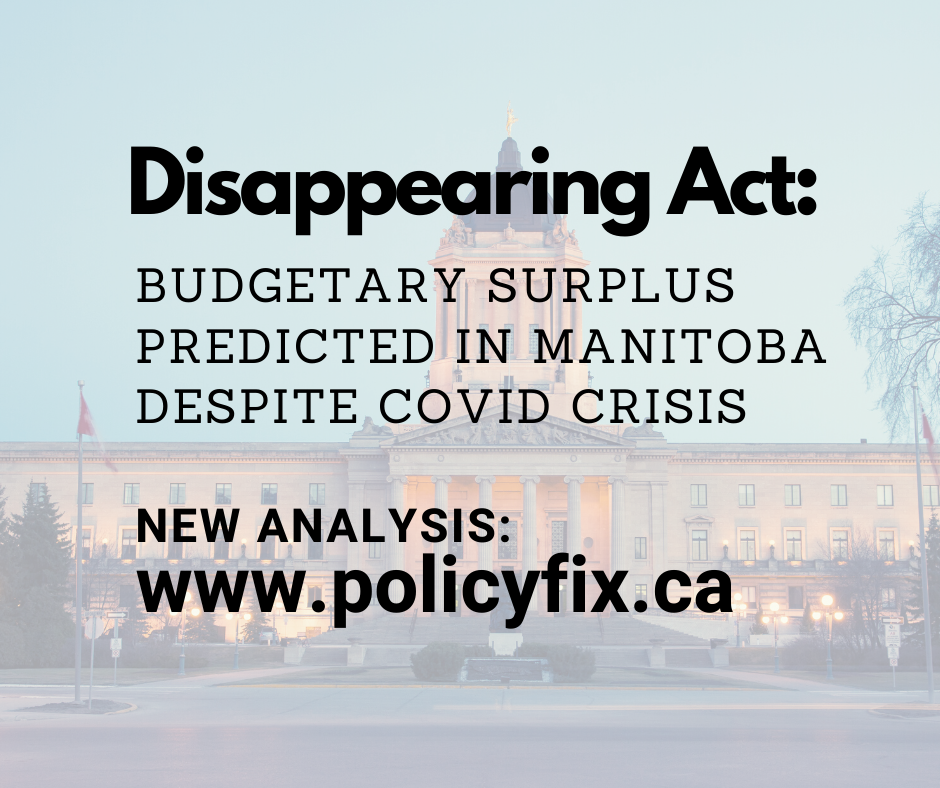By Molly McCracken

Recent projections of Manitoba’s finances find the province could be in a budgetary surplus by 2022 – 2023, despite the public health pressures COVID-19. This is due to Manitoba’s economy roaring back but also under-spending in public programs and generous federal fiscal transfers, finds a report released by the Canadian Centre for Policy Alternatives (CCPA) National office.
The report, Disappearing Act: The state of provincial deficits in Canada published last week, reviews the state of Canada’s provincial finances. Manitoba is among six provinces the CCPA is predicting will have surpluses in this year or the next.
The original deficit estimates from the provinces were far off the mark. Provincial fiscal situations across Canada have been boosted by major direct transfers from the federal government and indirectly through the strong economic growth federal COVID spending created. In Manitoba, this has resulted in Manitoba’s deficit being slashed from $1.5 billion to $1.1 billion (excluding the contingency fund) as the province also spent significantly less than originally forecast in budget 2021 – 2022.
Manitoba received $275 million more from the federal government than expected and collected $214 million more in taxes than foreseen. Disappearing Act shows that Manitoba has the money to strengthen the public health system, address the massive surgical backlog and adequately support a publicly-managed Long Term Care sector.
Instead, Manitoba chose to cut taxes during COVID, which is counterproductive. Had Manitoba not cut $192 million of annual revenue from the provincial education property tax the province would have received proportionally more revenue due to the booming real estate market to direct toward the starved public education system.
In addition, Disappearing Act found the actual amount that the provinces pay in interest on debt, adjusted to provincial GDP, is lower in 2021-22 than it was following the last recession in 2008. COVID deficits have resulted in additional net debt for Manitoba, however the increase in debt is more than offset by lower carrying costs due to interest rate decreases. The net result being that today Manitoba pays the equivalent of $168 million less in interest per year compared to 2009-10 after the last recession.
As CCPA has previously documented, Manitoba failed to provide COVID relief at the level of other provinces. For example Manitoba did not provide substantial support for health care worker retention, targeted support for the 70,000 Manitobans on provincial social assistance, and did not match federal funding for municipalities and transit. In total, Manitoba added a miniscule $300,000 in program expenditure in 2021, compared to $2.5 million in Saskatchewan and $3.3 in Alberta.
Now is definitely not the time for further tax cuts. Instead, with a strong economy, Manitoba should look to address it’s revenue problems and increase investment in social services that have been devastated over the last 65 years due to cuts and underinvestment.
Manitoba collects among the least revenue (as % of its GDP) of any province. Manitoba should reverse regressive tax cuts like the education property tax cut that disproportionately benefited wealthy property owners and instead help fixed income renters by boosting and expanding Rent Assist. The province also has room to increase taxes on corporations, institute new higher income tax brackets, and reverse our outlier status as the only province that does not tax the income of small businesses on an ongoing basis.
With inflation rising, the province can support those on modest and fixed income by boosting the provision of public services to keep costs down, as described in Understanding and Addressing Inflation in Manitoba, released earlier this month by Jesse Hajer. In many areas, such as health, education, and telecommunications, public provision is more efficient but lacking. On top of this, the climate crisis requires massive public investment, for example to retrofit homes and electrify transportation. These programs will improve equity and reduce costs, but require government leadership and upfront financial support.
The province also must be prepared for wage settlements with public sector workers due to their failed efforts at freezing public sector wages. This is upwards of $150 million for teachers, plus more for health care workers and the remaining 60,000 public sector workers who’ve had wages frozen and have been without a contract for years.
Going forward, any deficit in Manitoba in this upcoming 2022 – 2023 budget will be due to cuts in revenue, not COVID-19. The Manitoba government should act responsibly to help Manitobans in need recover from COVID and boost public systems to prepare for future shocks.
David Macdonald is the author of Disappearing Act and a Senior Economist with the Canadian Centre for Policy Alternatives (CCPA) National office. Molly McCracken is the director of the CCPA Manitoba office.


